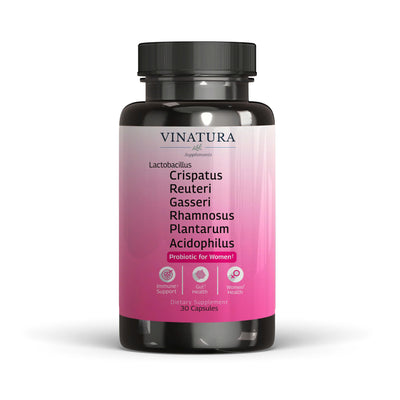
Which Probiotics Cause Weight Gain?
Considered one of the essential most beneficial pharmaceuticals, probiotics have become popular because of their many health benefits.
Besides, the impact of probiotics on weight is also a topic of increasing interest and research.
Understanding how Probiotics work and how they affect weight can help you use them effectively while staying in shape.
Before exploring further, please read the disclaimer located at the end of this webpage.
Key Takeaways
- Some probiotics cause weight gain, while some cause weight loss.
- Probiotics can affect weight by changing how the body absorbs fats and proteins and even by changing the structure of gut bacteria. Some Probiotics, such as Lactobacillus acidophilus and Lactobacillus fermentum, are related to the mechanism of weight gain.
- Certain strains of probiotics, Lactobacillus gasseri and rhamnosus, have been shown to help with weight loss.
- Probiotics may influence weight by influencing nutrient absorption and gut microbiota composition.
- Incorporating the appropriate probiotics into a healthy lifestyle is crucial for effectively managing weight.
Which Probiotics Cause Weight Gain?

Research has identified several probiotic strains that are associated with weight gain:
- Lactobacillus acidophilus: Studies have shown that this strain may be associated with increased body weight and fat mass in some individuals. A meta-analysis of 13 studies and 18 comparisons, including 3307 subjects (879 people) using L. acidophilus, showed a significant weight gain effect; the direction of effect was beneficial for weight gain in humans and animals [1].
- Lactobacillus fermentum and Lactobacillus ingluviei: Animal studies have shown that these strains can lead to weight gain and increased fat accumulation [1].
How Does Probiotics Cause Weight Gain Work?

Probiotics may contribute to weight gain through multiple mechanisms:
Changes in Calorie Consumption
Certain probiotics improve the intestines' ability to absorb nutrients, which can lead to higher calorie intake and potential weight gain. Some gut bacteria can break down fiber into short-chain fatty acids that your body can use for energy. If your gut bacteria get more energy from your food, it can lead to weight gain.
Changes in Gut Microbiota
The composition of your gut microbiome can affect your weight. Some studies show that obese people have different gut bacteria than lean people. If probiotics change your gut microbiome to promote weight gain, it could lead to weight gain.
Do Probiotics Help with Weight Loss?
Among the various species of Probiotics, in addition to probiotics that increase weight, probiotics that cause weight loss also exist in large quantities.
Furthermore, if you understand how to use Probiotics to gain weight, it can also help you lose or keep weight from changing.
Which Probiotics Help to Lose Weight?

The results of studies indicate that probiotics may benefit weight loss in overweight adults, as L. gasseri and L. amylovorus may promote weight loss [2].
Similar effects were also reported for L. plantarum and L. rhamnosus when combined with a low-calorie diet [1] [2].
In particular, some studies reported weight gain with L rhamnosus. However, this result may be due to the inclusion of yogurt in the participants' diets, which increased calorie intake and led to weight gain [2].
How Does Probiotics Help with Weight Loss?
Through the benefits of Probiotics to the intestines and digestive system, Probiotics can help with weight loss:
- Improved digestive function: Probiotics can help improve digestive function, leading to better nutrient absorption and reducing the risk of bloating, constipation, and diarrhea. Probiotics can regulate intestinal microbiota, promoting the reduction of body weight and fat mass [2].
- Boost metabolism: Some probiotics can stimulate the production of the hormone GLP-1, which promotes metabolism. Furthermore, improved insulin sensitivity in the hypothalamus leads to reduced food intake due to increased feelings of fullness. Reduced food intake and increased Fiaf expression promote weight loss [2].
How to Use Probiotics Without Gain Weight?

While L. acidophilus has been associated with weight gain, combining Lactobacillus with probiotics and other bioactive compounds can indeed support weight loss.
For example, L. acidophilus combined with L. Gassei, phenolic compounds (floridizin and isoflavones), and a calorie-restricted diet were found to promote weight loss [2].
Additionally, weight loss may not be solely due to the effects of probiotics. One human study showed weight loss after eating yogurt containing L. acidophilus combined with B. infantis and other bioactive compounds [1].
For L. rhamnosus, there are also studies mentioning weight gain, and research suggests that the reason is that when L. rhamnosus is used with a high-calorie diet, the body absorbs too much. In this regard, L. rhamnosus should be taken with a low-calorie diet to achieve your weight loss goals [2].
People should try adding probiotics to a healthy diet and regular exercise regimen for the best results!
Conclusion
Probiotics are important in maintaining digestive health and can affect a user's weight. Some probiotics, such as Lactobacillus acidophilus and Lactobacillus fermentum, have been studied and shown to cause weight gain.
Besides, species such as Lactobacillus gasseri, L. plantarum, and L. rhamnosus can effectively support weight loss by improving fat metabolism and increasing feelings of fullness.
If you know how to use probiotics, you can still receive its benefits and not gain weight. However, users should still combine it with a healthy lifestyle and reasonable diet to achieve the best results.
References
- [1] Million, Matthieu, et al. "Comparative Meta-Analysis of the Effect of Lactobacillus Species on Weight Gain in Humans and Animals." Microbial Pathogenesis, vol. 53, no. 2, Aug. 2012, pp. 100–108, https://doi.org/10.1016/j.micpath.2012.05.007. Accessed 22 Jan. 2020.
- [2] Crovesy, L, et al. "Effect of Lactobacillus on Body Weight and Body Fat in Overweight Subjects: A Systematic Review of Randomized Controlled Clinical Trials." International Journal of Obesity, vol. 41, no. 11, 10 July 2017, pp. 1607–1614, https://doi.org/10.1038/ijo.2017.161. Accessed 6 Dec. 2019.
Author

Product Disclaimer
Including an ingredient or study does not evaluate, endorse, or recommend any Vinatura product or any third-party product. Some ingredients discussed may not be used in any Vinatura product.
The content of the articles has not been evaluated by the Food and Drug Administration (FDA) and is not intended to promote or endorse any specific product. Any products sold on this website are not intended to diagnose, treat, cure, or prevent any disease.
Opinions and Endorsements
Any claims, statements, or opinions expressed in the articles are those of the author(s) and do not necessarily reflect the views or opinions of the manufacturers of the dietary supplement products. The products sold on this website are separate from the content of the articles and are not directly endorsed or associated with the information presented here.
Liability Disclaimer
The author(s) of the articles, website, and manufacturers of the dietary supplement products do not assume any liability for any potential consequences arising from the use of the information provided in the articles. Ingredient effects, dosages, and safety vary by individual, formulation, and context; some ingredients interact with medications or may be unsuitable during pregnancy or lactation. It is recommended that individuals consult with a qualified healthcare professional before making any dietary or lifestyle changes, including the use of dietary supplements.
Product Usage
Please refer to the product labels and packaging for specific usage instructions and guidelines for the dietary supplement products sold on this website.
Customer Support
For any concerns or questions regarding the dietary supplement products, please contact our customer support team, who will be more than happy to assist you.






Leave a Comment
Be the first to comment.
What do you think?